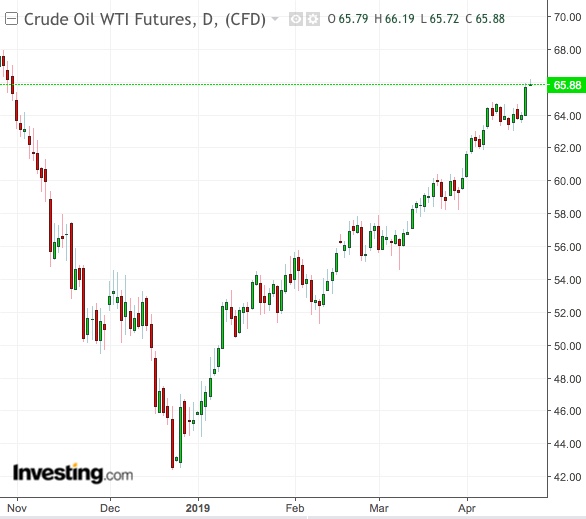The biggest winners of U.S. President Donald Trump’s ban on Iranian oil will be the Saudis. The biggest losers might not be the Iranians.
From China to India, as well as the United States, countries that primarily import oil are expected to pay more in the coming weeks and months as Saudi Arabia and its allies in OPEC maintain a razor-focus on revenue rather than ensuring enough oil for the world.
A Perfect Storm For Consumers
Making it a perfect storm for consumers will be fund managers chasing crude prices higher until there is—to borrow a page from the Saudi playbook—enough evidence of “market rebalancing”. The difference, of course, is that to change the direction of the market, the proof required this time will be that there’s abundant flow of oil again, versus the notion of tight supply that the Saudis were desperate to create just months ago.

U.S. West Texas Intermediate crude has gained 45% in 4-1/2 months of Saudi and Russian coordinated production cuts under their enlarged OPEC+ club, besting the 40% it lost through the fourth quarter of 2018. Brent, the global oil benchmark, has risen 38% this year while U.S. gasoline has jumped even more, by 61%.
Trump expects OPEC+ members to quickly reverse their production cuts, as well as replace lost barrels from Iran and other sources such as Venezuela and Libya.
Riyadh stopped short of giving such assurance.
The president tweeted:
"Saudi Arabia and others in OPEC will more than make up the Oil Flow difference in our now Full Sanctions on Iranian Oil.”
No Free-Flowing Oil At Prices Consumers Want
Arab News, meanwhile, quoted Saudi Energy Minister Khalid al-Falih as saying the Kingdom will work to ensure the availability of oil supplies and the lack of market imbalance following the end of the U.S. sanction waivers on Iran. Decoded of political niceties, his remarks meant that whatever oil flows to the market will be at OPEC’s call—certainly not free-flowing and at prices consumers wished to pay.
Ellen R. Wald, oil market analyst and energy policy consultant who also authors a weekly column for Investing.con, said in a separate tweet that Saudi Arabia “isn't going to hamstring itself in OPEC by committing to a certain number of barrels”.
Scott Shelton, energy futures broker at ICAP in Durham, N.C., advises investors to beware of an oil rally that could get out of hand as “many think that (the) spare capacity (of the Saudis) is less than advertised” to put enough barrels on the market to win the perception game waged by fund managers.
Iran’s Business May Not Be Affected As Much As Thought
As for Iran, the Islamic Republic is expected to continue with the business of exporting its oil, with or without U.S. approval. For the first half of the past year, the Iranians operated stealthily to ensure their oil got to customers despite the sanctions. In the latter half, the Trump administration itself facilitated Tehran by giving out sanction waivers.
Now that Washington has terminated those waivers, a total of eight countries—China, India, Japan, South Korea, Taiwan, Turkey, Italy and Greece—are in a limbo over the security of their oil supply. The biggest of them—China—isn’t pleased to be at the mercy of an increasingly hawkish OPEC for its oil.
As the New York Times noted on Monday, all the eight countries initially approved by Washington for sanction waivers were U.S. allies on major security and diplomatic issues that did not involve Iran. China was the most sensitive of the lot, given the United States’ efforts to seal a trade deal with the world’s second largest economy.
China Protests Loudly At Trump's Move; India Less
Half of Iran’s estimated yearly export of one million barrels per day goes to China. Beijing pushed back hard against Washington’s aim to bring Iranian oil exports to zero, with Foreign Ministry spokesman Geng Shuang saying that “China consistently opposes U.S. unilateral sanctions”.
Geng added:
“The Chinese government is committed to protecting the legitimate rights and interests of Chinese enterprises.”
Unlike China, Iran’s other customers like India might choose to suffer quietly rather than criticize Trump.
Amit Bhandari of the Indian Council of Global Relations told Russian news site Sputnik:
“India has other options to buy oil. India imports about 4 million bpd and less than 10% of this comes from Iran. It is not that we are going to pay a higher price for just this 10%. Instead, the crude price increase will apply on our total oil imports.”
U.S. President Likely To Feel Americans’ Pain Too
But closer to home, Trump might feel the heat of higher oil and fuel prices through the pain endured at the pump by Americans, who have to decide whether to reelect him next year.
Riyadh and Washington have a history of cooperating for decades in curbing Iran's rise as a Middle East power. They also have their own motivations.
For the Saudis, it is decades of enmity with a country that ironically counts as one of the most important members of the OPEC cartel.
For Trump, it will be an extension of his mission to punish the Rouhani regime, which he accuses of evil terror deeds and of getting an undeserved deal from his predecessor Barack Obama to export its oil in return for what he deemed too liberal curbs on its nuclear program.
But none of these might be as important to Trump as keeping his electorate happy with low oil prices—and that isn’t a win for now.
